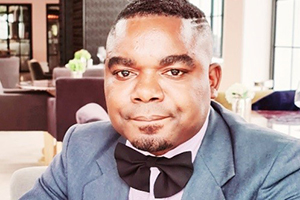College of Law
Addressing his family injustice by pursuing law
Unisa alumnus Segopotje Mampuru firmly believes that thuto ga e tšofalelwe, which means that one is never too old for education. He completed his LLB degree in his late 50s at Unisa's College of Law in 2021. Mampuru believes in the value of education that this specific qualification is his third, and has enrolled for a Master's in Extractive Industry Policy, Management and Regulation at a different institution. "I regard completing my law degree as the beginning of good things. The sky is the limit; I will continue to study until I reach my last days," affirms Mampuru.

Segopotje Mampuru
Beyond his passion for education, Mampuru says that he studied law to address the injustice suffered by his family in the 1960s. He explains: "My parents were banished from the Sekhukhune area in Limpopo to the Eastern Cape's King William's Town in 1961. My father was an activist and a founding member of a protest movement known as Makhuduthamaga, which was active in the Sekhukhune area in the 1960s." He adds: "The movement fought for the land rights of black people in the rural area against the white regime dominance, which was led by Balthazar Johannes Vorster, who served as the prime minister of South Africa, and later as the fourth state president of South Africa during the apartheid era."
Mampuru's mother was unemployed, and his father, Motodi "Ntoampe" Mampuru, was subjected to hard labour and was only paid about seven rands a month to care for his three wives and children whom he had left in Sekhukhuneland. As a result, Mampuru and his four siblings were born in banishment. "We only started schooling in Sekhukhuneland upon release in 1975. All my siblings could not go beyond Grade 12 due to financial constraints, but I managed to pursue my studies through hustling for odd jobs," he states.
Mampuru remarks: "The law degree will help to fight for my parents, who the current government never recognised for their fight against apartheid." He continues: "My father passed on in 1979, but my 92-year-old mother still wishes for reparation and justice. But, unfortunately, she only received an invitation from the African National Congress's local municipality during their centenary celebrations and a promise for compensation, which never happened."
Eyes on the goal
Mampuru is awaiting the Limpopo High Court's decision on his application to be admitted as an advocate. However, he is keen to accept any opportunity that relates to the field of law, including the serving of articles. "I have a keen interest in human rights and would like to serve as a human rights law practitioner. I hope to retire as a senior education specialist at Limpopo's Department of Education at the end of this year to focus on my legal career," he says.
Seeing his passion for addressing instability, inequality, corruption and most importantly, the abuse of human rights, Mampuru's daughter, Tsebo Mampuru, encouraged him to pursue his dream of becoming an advocate. His dream was earlier crushed by the poor economic status of his family, but the aim is not to give up. He says: "I embrace my daughter's wise words that no dream is fulfilled unless you pursue it."
A view of the current South African legal system
According to Mampuru, the South African legal system needs to be reviewed. He raises concern about the poor accessibility of the courts for the underprivileged majority. He states: "Many people who greatly suffered the injustice of the past are poor and do not understand the legal system. For instance, most of these people could not meet the deadline for the Truth and Reconciliation Commission applications, therefore, could not be compensated."
Mampuru notes that non-governmental organisations such as the Khulumani Support Group have been fighting without success to have these marginalised people considered for compensation. He remarks that he is concerned about the unfair benefit of some allegedly politically aligned people. "At least, a portion of the money looted during the state capture should have been used to compensate these legends, who fought against apartheid," he says.
Unisa is affordable and convenient
Mampuru could not afford to study on a full-time basis. "Therefore," he continues, "as a father and breadwinner, I chose to study at Unisa as, unlike other institutions of higher learning, it is affordable and convenient. Also, I can study at my own pace and in the comfort of my space."
"To all existing and prospective students, it is never too late to achieve your goal." He concludes: "Persevere and stay focused; your success is certain."
* By Nancy Legodi, Acting Journalist, Department of Institutional Advancement
Publish date: 2022/07/26

 Unisa co-hosts G20 community outreach in the Eastern Cape
Unisa co-hosts G20 community outreach in the Eastern Cape
 Unisans gain membership of prestigious science academies
Unisans gain membership of prestigious science academies
 Advocating for disability transformation through servant leadership
Advocating for disability transformation through servant leadership
 Unisa Press continues to illuminate the publishing space
Unisa Press continues to illuminate the publishing space